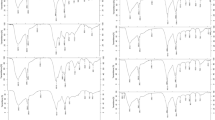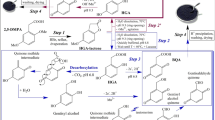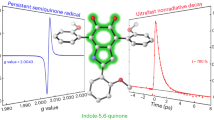Abstract
As already reported, copper–xanthopterin accelerates the autoxidation of 3,4-dihydroxyphenyl-alanine1. In the course of further work, we have observed some interesting effects with cupric ions.
This is a preview of subscription content, access via your institution
Access options
Subscribe to this journal
Receive 51 print issues and online access
$199.00 per year
only $3.90 per issue
Buy this article
- Purchase on Springer Link
- Instant access to full article PDF
Prices may be subject to local taxes which are calculated during checkout
Similar content being viewed by others
References
Isaka, S., and Ishida, S., Nature, 171, 303 (1953).
Isaka, S., J. Coll. Arts and Sci., 1, (3), 184 (1954).
Emeléus, H. J., and Anderson, J. S., “Modern Aspects of Inorganic Chemistry”, 181 (1952).
Martell, A. E., and Calvin, M., “Chemistry of the Metal Chelate Compounds”, 388 (1952).
Author information
Authors and Affiliations
Rights and permissions
About this article
Cite this article
ISAKA, S., AKINO, M. Effect of Copper Cyanide upon the Formation in vitro of Melanin. Nature 177, 184–185 (1956). https://doi.org/10.1038/177184a0
Issue Date:
DOI: https://doi.org/10.1038/177184a0
Comments
By submitting a comment you agree to abide by our Terms and Community Guidelines. If you find something abusive or that does not comply with our terms or guidelines please flag it as inappropriate.



